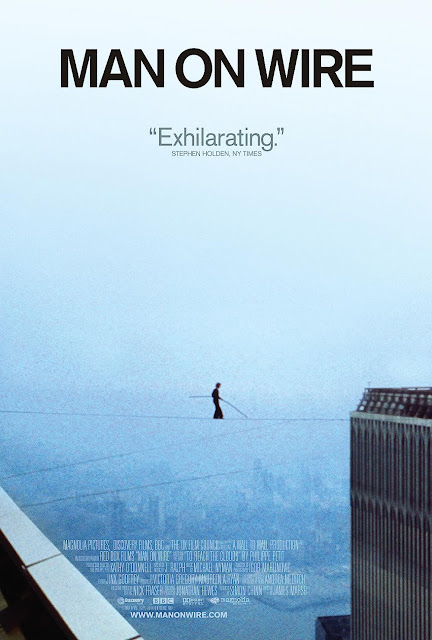Man on Wire
Four men are hiding under construction tarps near the tops of twin NYC skyscrapers. The waiting is painful; they can't move, unsure if security guards are still pacing around, watching for anything unusual. Little do those guards know that one of the four gentlemen will, by dawn the following morning, have exacted his master plan. A highly unusual one.
MAN ON WIRE, despite the description I've laid out for you, is not a thriller, at least in the traditional fictional sense. In 1974, there was a cheerful yet singularly determined Frenchman named Phillipe Petit, who organized and excuted a tightrope walk between the twin towers of the World Trade Center. This illegal act would be the piece de resistance of a career that already allowed high wire stunts at Notre Dame in Paris and the Sydney Harbour Bridge in Sydney, Australia. The authorities would never approve such actions, of course, so each time Petit returned to earth, he was greeted with handcuffs. A man so focused to his craft also never took the time to get permits for his regular street juggling, so being arrested was a familiar formality.
James Marsh's documentary frequently features Petit describing his arrest record, and how he never considers the aftermath. His mind is wired for artistic challenges, not worry over terrestrial consequence. Such people are cause for concern for the more traditionally rational among us, including Petit's co-conspirators and girlfriend. After Petit indeed walks between the Twin Towers (for nearly an hour), his relationships will suffer irreparably. Sometimes that is the price in the pursuit of the grandiose. And the insane, so thought the NYPD after they apprehended the man and had him go for a mandatory psychiatric eval. You can't blame them, especially you of the rational mindset. A wire strung by rope. Nearly 1,400 hundred feet upwards. Unpredicatble wind conditions. No safety net. For Petit, these were not roadblocks.
MAN ON WIRE, its title dervied from the actual words on Petit's police report, sounds and plays like a suspense film. Marsh presents the events of the night before and morning of the walk (not heist, though the thriller elements aren't far off) with the anticipation of a lit fuse with a short wick, even though we know the outcome. The story of this peculiar stunt lends itself to such treatment, and Marsh beautifully weaves testimony, original home movies (with better than average production values - the crew were film school pals of Petit's), and a few recreations seamlessly. It was, at times, like watching a more up-to-date RAFIFFI! How the stunt came together cannot be left to coincidence. Much went wrong as Pettit's crew attempted to get the wire strung from one rooftop to the other. A bow and arrow and Petit's nudity made it possible. Yes, the details are so bizarre they can only be true.
The best documentaries entirely absorb you into their propaganda. Errol Morris' THE THIN BLUE LINE is another example of a riveting narrative with suspenseful cinematic elements: sharp editing, choice scoring, and revealing narration. MAN ON WIRE's recount is fairly objective, with points-of-view that differ among the interviewees, but not wildly so. If there is an agenda to this movie, it is to invite you into the mind of free spirit who is truly free of any inhibition. So infectious is his enthusiasm, you may feel admiration, jealousy, and concern for the fellow at various times.
The tragedy of 9/11/2001 is not mentioned or even hinted at in MAN ON WIRE. I agree with its exclusion. However, watching this film at this late date creates a warm nostalgia, lending a certain innocence to Phillipe's daring do. Highly recommended.



Comments